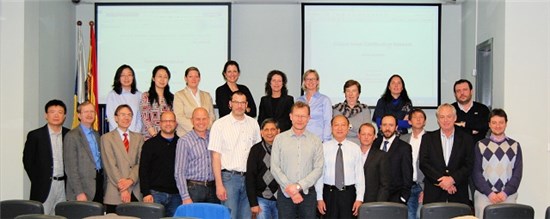
The work of the Global Solar Certification Network (GSC-NW) is expected to continue within the framework of the IEA Solar Heating and Cooling Programme (SHC). The Executive Committee of the IEA SHC approved the set-up of a task definition workshop in Paris on 7 October 2015, in order to establish a new task under the title International Standards & Global Certification. “Collector and system manufacturers selling products in several countries, as well as representatives of certification bodies, test labs and inspectors from all around the world are invited to join the meeting in Paris and become members of the international research community discussing the harmonisation of standards and certification schemes worldwide,” explains Jan Erik Nielsen, Manager of the GSC Network and initiator of the new task. Other groups which could benefit from the new two-year task are stakeholders and public authorities in countries which do not have standards in place yet or which employ old ones. The network plans to develop guidelines for them on how to correctly use the international standards and to offer training materials and assistance. The photo shows the expert group during the first GSC Network meeting in Spain in April 2014.
Photo: GSC Network
The Global Solar Certification Network had been established as part of Task 43 called Solar Rating and Certification – Global Collector Certification, which ended after six years in June 2015. The original, ambitious aim of the last phase of IEA SHC Task 43 was to establish a Global Solar Certification Scheme. “A well-advanced draft of such a global scheme was worked out and finalised for approval – but just before the third GSC Network meeting in China in October 2014, some certification bodies hesitated to give up their own marks,” Nielsen explains.
Mutual recognition saves industry money for re-testing
After some discussions in Beijing, the Task 43 researchers agreed on a mutual recognition approach instead. “So, the existing national and regional certification schemes are kept – but the manufacturers can use test and inspection reports made under one certification scheme when they apply for certification in another,” Nielsen says. The experts reached an agreement on common test standards and test procedures which must be fulfilled by a certification scheme to be incorporated into the global recognition approach and start operation. At the GSC Network meeting in Beijing, country representatives of eight countries were present: Australia, China, Denmark, Germany, Portugal, Spain and the USA. Nielsen also counts on the participation of six more countries in the new task: Austria, France, Italy, Sweden, Switzerland and the UK.
The industry sees the mutual recognition as already a big step forward, since manufacturers only have to pay certification fees when applying for a national quality mark – but not for re-testing and re-inspections, which are both more costly. The Board of Directors of the European Solar Thermal Industry Federation, ESTIF, discussed the new concept and expressed its support for it as well.
The new task International Standards & Global Certification will run over two years, starting at the beginning of 2016, and it will pursue the following objectives:
- Harmonising standards and certification schemes at international level, in order to increase the overall level of quality and to avoid the need for re-testing and re-inspection;
- Convincing stakeholders and local authorities to use ISO standards when implementing new certification schemes;
- Developing guidance on certification schemes to support local authorities which want to implement a new national certification scheme and to improve existing schemes;
- Promoting mutual recognition through national industry associations.
All companies and institutions interested in participating in the Global Solar Certification Network, please contact Jan Erik Nielsen: manager@gsc-nw.org
More information: